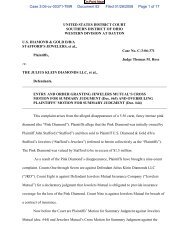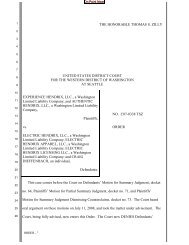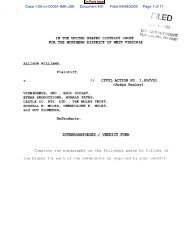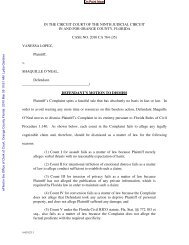GORDON KEENE VELLA. - On Point News
GORDON KEENE VELLA. - On Point News
GORDON KEENE VELLA. - On Point News
You also want an ePaper? Increase the reach of your titles
YUMPU automatically turns print PDFs into web optimized ePapers that Google loves.
Q. . . . [defendant’s] lawyer they said, “Are you board certified, sir”? You<br />
answered, “Yes. I passed boards in internal medicine and cardiovascular<br />
disease.” That wasn’t true, was it?<br />
A. Well, actually, I wouldn’t put a period after the yes, I made it very clear I<br />
passed my boards [in] internal medicine and cardiovascular disease, I did.<br />
Q. But the question is: “Are you board certified, sir”? And you told a jury<br />
under oath, yes, and you are not board certified.<br />
A. I absolutely in no way intended to misrepresent the currency of my<br />
certification, absolutely not.<br />
Q. But you may not have intended it, but it was wrong, and you told a jury it<br />
was wrong.<br />
A. No, sir, I did not intend to represent that I wasn’t lapsed or expired at all.<br />
Q. Are you board certified or not?<br />
A. My boards have lapsed. I’m not currently board certified. I have been<br />
very clear about that.<br />
Q. So you think that was clear to the jury in New Orleans?<br />
A. Yes, I believe so.<br />
Id. at 593.<br />
The Vioxx court summarily rejected that rationale in granting the plaintiff’s subsequent<br />
rule 60(b)(3) motion. Despite the expert’s protestations, the court had no difficulty finding that<br />
the subsequent testimony constituted clear and convincing evidence that the expert had<br />
misrepresented his qualifications to the court and to the jury. Moreover, the testimony revealed<br />
that the expert “sought to avoid admitting that he was no longer board certified by adding a<br />
caveat to his answer.” Id.<br />
Additionally, the court found that the misrepresentation had, in fact, prevented the<br />
Plaintiff from fully and fairly presenting her case to the jury. As justification for its findings, the<br />
court noted that the witness “was a central witness in this case, and he offered expert opinions on<br />
specific causation, arguably the central issue in this entire litigation.” Id. at 594. Furthermore,<br />
the court stated that the misrepresentation called into question the court’s acceptance of him as<br />
an expert and called into question his propensity for truthfulness. Id. Accordingly, the original<br />
judgment was vacated and a new trial ordered.<br />
- 6 -
















